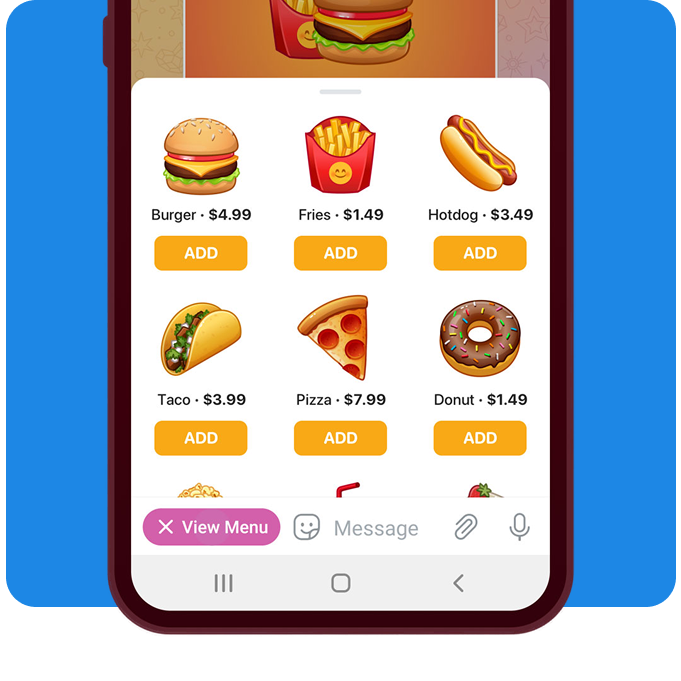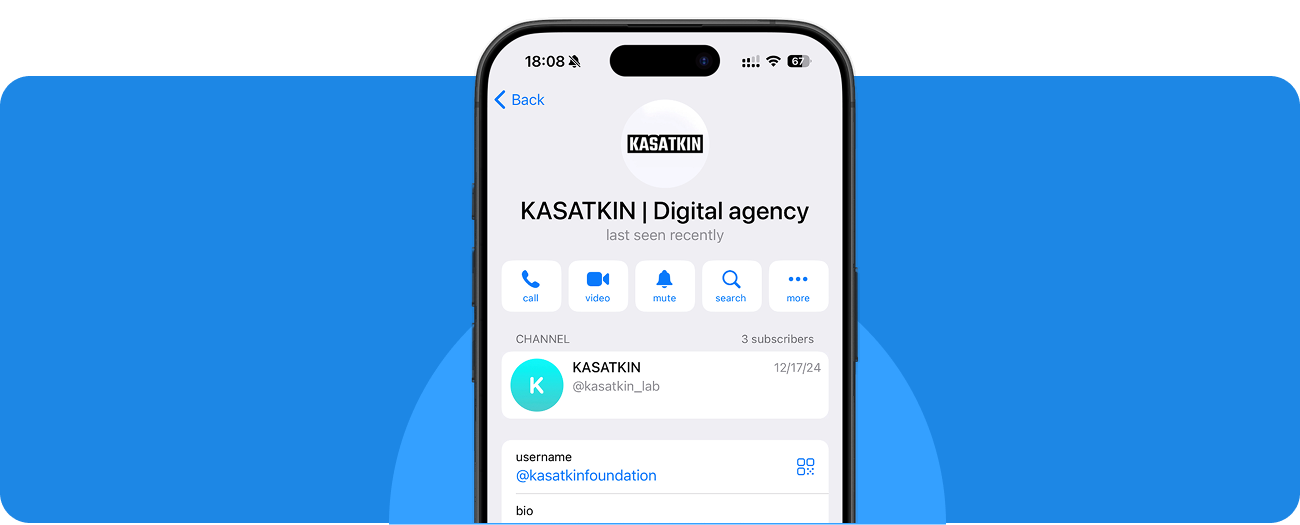KASATKIN
Complex website
development










We offer turnkey website development, starting from the concept and ending with a full-fledged launch. Our services include:
Landing
A landing page is a single-page website with clearly structured and compelling content designed specifically to interest visitors and motivate them to take a specific action. Typically, a landing page has the following key features:1. Single-Page Structure: All information and content of the landing page are presented on one page, ensuring ease of understanding and convenience for the visitor2. Engaging Content: The landing page includes attractive headlines, descriptions, images, or videos that purposefully grab attention and generate interest among visitors3. Call to Action (CTA): The primary goal of the landing page is to prompt visitors to take a specific action, such as signing up, subscribing, purchasing a product or service, etc. The CTA is often highlighted and prominent, such as with buttons like Register Now, Buy Now, or Request a Quote.
Nikolay Kasatkin


Advantages of working with us
We carefully analyze the needs of each client in order to offer the optimal solution.
Platforms and technologies
- Javascript
- Typescript
- Python
- React
- Nest.js
- Java
- Mongodb
- Mariadb
- Next.js
- Vue
How we work
At this stage, we are gathering project requirements and developing a preliminary proposal that aligns with your needs and budget. After agreeing on the terms, we will proceed to sign a contract, including a confidentiality agreement (NDA) if it is necessary for you.
Team
Project-manager
Responsible for organizing the team's work. Manages project changes, checks the fulfillment of requirements, and ensures their alignment with project goals at each stage. Analyzes deviations and errors, implements corrective measures. Communicates with the client on technical and project matters.
Tech lead
Senior specialist, resolves business-level technical issues, determines the technology stack, participates in architecture development, and conducts code reviews for key tasks.
Team lead
Responsible for the team of developers and technical management. Defines the development strategy, assigns tasks to team members, checks their completion and deadlines, and conducts code reviews.
QA-lead
Leads a team of QA specialists, develops testing plans, assigns and oversees testing tasks. Defines project quality metrics and criteria, selects testing approaches and tools. Sets testing deadlines, conducts risk analysis, and is responsible for the overall quality of the product.
Have a question?
What is complex website development and how does it differ from regular ones?
Complex website development is the creation of multifunctional, highly loaded web resources with unique business logic and deep integrations. Unlike typical websites, complex projects include individual architecture, work with large amounts of data, many external integrations (for example, with ERP, CRM, payment systems) and high performance and security requirements. We create systems such as marketplaces, FinTech platforms, educational portals, and integrated CRM systems.
Why would my business need to create a complex website?
Creating a complex website is necessary when your business goes beyond standard solutions. Such projects allow you to automate complex business processes, significantly reduce costs, improve customer interaction, process large amounts of data, and scale without restrictions. This is a strategic investment for companies seeking digital supremacy and sustainable growth in a competitive market.
How much does it cost to create a complex website in Kasatkin.io?
The question of how much it costs to create a complex website is different for each project. The price is formed based on the unique requirements for functionality, design complexity, volume of integrations, selected technologies and deadlines for implementation. We offer transparent pricing and a detailed assessment after analyzing your needs so that you accurately understand the investment in developing a complex web project.
What technologies do you use when developing complex websites?
When developing complex websites, we use advanced and proven technologies. For the front-end, these are JavaScript frameworks (React, Next.js, Angular, Vue.js), and for the backend — Python, Go, Node.js, Django. We also specialize in developing decentralized applications, smart contracts, and highly loaded databases, ensuring maximum performance and security for your solutions.
Cooperation
Tell us about your project and we will advise you on development.










Developing Complex Web Solutions: Your Path to Digital Excellence with Kasatkin.io
In today's dynamic digital world, where competition is constantly growing, standard websites are no longer able to fully meet business needs. True breakthrough and scaling require non-standard, multi-functional, and high-performance solutions. This is where the development of complex websites and the development of complex websites that become the foundation for innovative projects and the sustainable development of your company come to the fore.
What is a Complex Web Project and Why does your Business Need It?
The concept of a 'complex web project' covers a wide range of digital products that significantly go beyond typical corporate websites. These can be multi-level portals, highly loaded services, marketplaces, decentralized applications, powerful CRM systems, innovative educational platforms, or comprehensive FinTech solutions integrated with multiple external systems.
The key features that make the project complex include a multi-stage architecture with deeply thought-out business logic that ensures smooth interaction of numerous modules. This also includes the need for personalized functionality, work with large amounts of data, numerous integrations with ERP, CRM, payment systems and third-party APIs, as well as high security and performance requirements. The goal of creating complex websites is not just to have an online presence, but to form a powerful tool for automating business processes, optimizing costs, increasing conversions, and ultimately increasing profits. This approach provides complete freedom in the implementation of the most ambitious ideas.

Kasatkin.io : Your Reliable Partner in the Development of Complex Web Projects
- Since 2020 Kasatkin.io He has established himself as an expert in the development of complex web projects, offering a full range of digital services for businesses and startups. Our mission is not just to create IT solutions, but to strategically increase your revenue and reduce costs through deep consulting and the use of advanced technologies. We believe that every product we develop should bring real benefits, and we strive to achieve maximum results for our customers.

Our Approach to Developing Complex Websites
The process of developing complex websites in Kasatkin.io It is built on the principles of transparency, efficiency and strict quality control. We adhere to the international standards ISO 9126, IEEE 829-1998 and ISO 9001:2015, which guarantees perfect performance at every stage:
- Analysis and Concept: Deep immersion into your subject area, requirements analysis, formulation of goals and objectives. Joint development of a unique concept, design, structure and functionality of the project.
- Terms of Reference: Detailed specification of all customer requirements, description of the architecture of the system, components, interactions and technological stack. This is a key stage for the successful development of complex websites.
- Engineering and Design: Prototyping and detailed layouts (Figma), animation of interfaces (Principle). Developing a unique design that provides an intuitive user experience (UI/UX).
- Programming and Layout: Direct development of complex web sites using advanced technologies. We use adaptive layout on Flexbox, as well as HTML5, CSS3, JavaScript frameworks (React, Next.js, Angular, Vue.js, Nuxt.js) for the client side. Python, Go, and Node are used for server logic.js, and Django for the content editing panel. Our expertise also includes the creation of decentralized applications, smart contracts, cryptocurrency platforms, and Telegram Mini Apps.
- Testing and Launch: Thorough verification of functionality, performance and security. Project launch and preparation for indexing.
- Support and Development: We offer comprehensive support and further development of the project, ensuring its stable operation and relevance.
How Much Does It Cost To Create A Complex Website? Understanding Investments
- The question 'how much does it cost to create a complex website' is one of the most important for our clients. It is important to understand that the price for developing complex websites cannot be fixed, since each project is unique. The cost is formed based on many factors: the complexity of the functionality, the scale of the project, the individual design, the technologies used and the timing of implementation.
- In Kasatkin.io We offer flexible and transparent cooperation models.: Fixed Price for projects with clearly defined requirements and Time & Materials for more dynamic projects. We always provide a detailed project assessment after a thorough analysis of your needs, ensuring full transparency of pricing. Investing in the creation of a complex website is a strategic contribution to the long—term competitive advantage and sustainable growth of your business, bringing a high return on investment in the long term.

Advantages of Cooperation with Kasatkin.io
- Selecting Kasatkin.io To develop complex websites, you get not just a performer, but a strategic ally. We guarantee an individual approach by creating a product that fully meets your unique requirements. Our team has deep expertise in niche areas (FinTech, Retail, Healthcare, Education). We offer truly comprehensive IT solutions: from web portals to smart contracts. Our work is always result-oriented.: We create products that bring real value, increase revenue, and optimize processes. And, of course, we use only modern technologies that ensure maximum reliability, high scalability and impeccable security of your digital solutions.
- If you are ready to take your business to a fundamentally new digital level and need a reliable, experienced and innovative partner to develop complex web projects, please contact us. The team Kasatkin.io It will help you realize your most ambitious ideas and create a powerful digital product that will become your key competitive advantage in today's market.